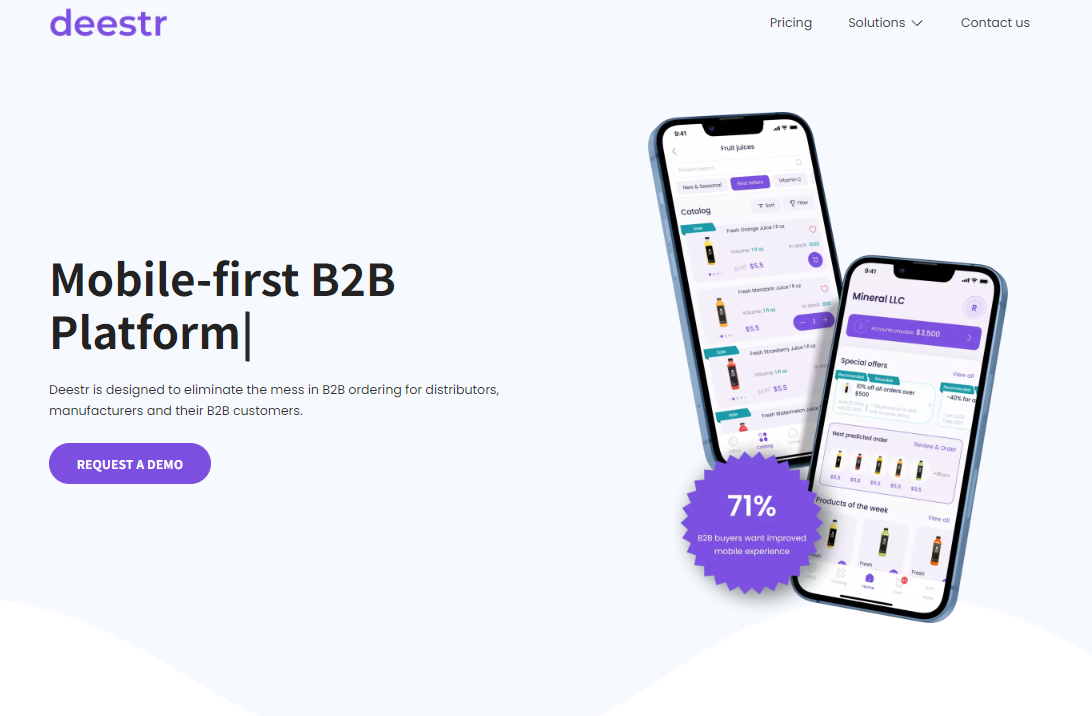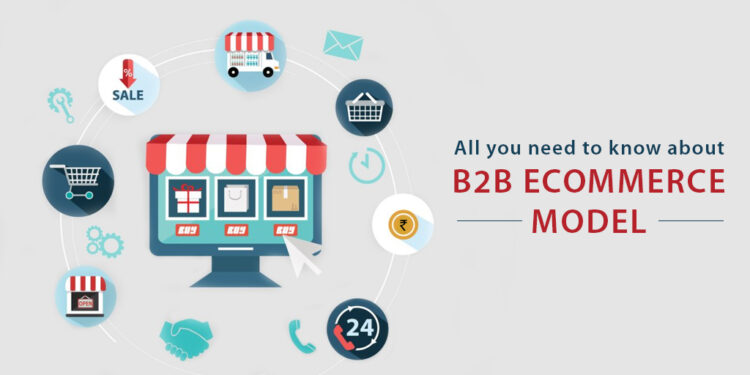In today’s fast-paced business world, efficiency and streamlining operations are key to success, especially in the realm of B2B (Business-to-Business) transactions. A B2B ordering platform serves as a crucial tool in this regard, enabling businesses to automate and enhance their sales processes. This article aims to demystify the concept of B2B ordering platforms, exploring their functionalities, benefits, and how they are transforming the way businesses interact and transact with each other. Visit https://deestr.com/ Today and Expand Your Knowledge Horizons!

What is a B2B Sales Platform?
A B2B sales platform is an online system designed specifically for the transactions and interactions between businesses. Unlike B2C (Business-to-Consumer) platforms, these systems cater to the unique needs of companies dealing in bulk orders, long-term contracts, and complex sales processes. They offer features like custom pricing, order tracking, and inventory management, which are essential for smooth B2B transactions.
What is a B2B Wholesale Platform?
B2B wholesale platforms focus on facilitating transactions between manufacturers, distributors, and retailers. They streamline the process of buying and selling goods in large quantities, offering features like bulk order discounts, detailed product catalogues, and logistics management. This specialization in wholesale trade makes them an indispensable tool for businesses operating in this domain.
What is an Online Ordering System?
In the context of B2B, an online ordering system refers to the web-based interface through which businesses place and manage orders. This system simplifies the purchasing process, allowing for real-time inventory checks, automated order processing, and digital payment solutions. It’s a key component of a comprehensive B2B ordering platform, ensuring efficient and error-free transactions.
The Role of Deestr in B2B Ordering Platforms
Deestr, a prominent player in the field of digital solutions, offers robust platforms for B2B ordering. With a focus on customization and user-friendly interfaces, Deestr’s platforms empower businesses to optimize their sales and wholesale operations. By integrating advanced features like AI-driven analytics and mobile accessibility, Deestr ensures that its platforms are not only functional but also ahead of the technological curve.
Advantages of Using B2B Ordering Platforms
- Efficiency in Operations: Automated processes reduce manual errors and save time.
- Enhanced Customer Experience: User-friendly interfaces and personalized features improve customer satisfaction.
- Data-Driven Insights: Analytics tools provide valuable insights into buying patterns and inventory management.
- Scalability: Platforms can be scaled according to business growth and changing market demands.
Implementation and Best Practices
Implementing a B2B ordering platform involves careful planning and consideration of various factors. Businesses should assess their specific needs, choose a platform that aligns with their objectives, and train their staff to effectively use the system. Continuous evaluation and adaptation are crucial to ensure the platform remains effective and relevant.
The Future of B2B Platforms: Trends and Predictions
As we look towards the future, several trends are set to shape the evolution of B2B ordering platforms. These include the integration of artificial intelligence for predictive analytics, the rise of mobile commerce, and an increased emphasis on personalized customer experiences. Businesses that stay ahead of these trends, possibly with the aid of solutions like those offered by Deestr, will likely lead the market in efficiency and customer satisfaction.
The Impact of AI and Machine Learning
Artificial Intelligence (AI) and Machine Learning (ML) are rapidly transforming B2B ordering platforms. These technologies enable platforms to offer predictive ordering, personalized product recommendations, and intelligent inventory management. The result is a more intuitive and efficient ordering process, which not only saves time but also reduces the potential for human error.
Mobile Commerce and Accessibility
The shift towards mobile commerce is undeniable. B2B ordering platforms are increasingly offering mobile-friendly interfaces, enabling business professionals to manage orders on-the-go. This mobility is crucial in today’s fast-paced business environment, where decisions and transactions need to happen in real-time, regardless of physical location.
Enhancing Customer Experience through Personalization
Personalization is becoming a key differentiator in B2B platforms. By leveraging data analytics, platforms can now offer personalized experiences tailored to individual business needs. This includes customized pricing, product recommendations, and even personalized marketing messages. Such tailored experiences not only enhance customer satisfaction but also build long-term business relationships.
Challenges and Solutions in B2B Ordering
While B2B ordering platforms offer numerous benefits, they also come with challenges. Integration with existing systems, data security, and user adoption are some of the hurdles businesses might face. Overcoming these challenges requires a strategic approach, including choosing the right platform provider, prioritizing security features, and investing in employee training and support.
Key Takeaways for Businesses
- Choose the Right Platform: Assess your specific needs and select a platform that aligns with your business goals.
- Focus on Security: Given the sensitive nature of B2B transactions, prioritize platforms with robust security measures.
- Invest in Training: Ensure your team is well-equipped to use the platform effectively.
- Stay Informed about Trends: Keep abreast of emerging trends in technology and consumer behavior to leverage the full potential of your B2B ordering platform.
Navigating the Integration of B2B Platforms
A critical aspect for businesses is integrating a new B2B ordering platform with their existing systems. This process involves several key steps:
- Assessment of Current Systems: Understanding the capabilities and limitations of existing systems is crucial.
- Data Migration and Security: Safely transferring data to the new platform while ensuring its integrity and security.
- Customization and Testing: Tailoring the platform to meet specific business needs and conducting thorough testing to ensure seamless operation.
- Employee Training and Support: Preparing staff for the transition with adequate training and ongoing support.
User Experience: A Core Focus
The success of a B2B ordering platform heavily relies on its user experience (UX) design. Platforms should be intuitive, easy to navigate, and responsive. A well-designed UX can significantly enhance user adoption rates and overall satisfaction. Businesses should seek platforms, like those created by Deestr, that prioritize a seamless and engaging user experience.
Leveraging Analytics for Strategic Decisions
Modern B2B platforms are equipped with sophisticated analytics tools. These tools offer insights into sales trends, customer behavior, and operational efficiency. By leveraging this data, businesses can make informed strategic decisions, leading to improved product offerings, marketing strategies, and customer service.
Building a Sustainable Future with B2B Platforms
The role of B2B ordering platforms extends beyond mere transactional processes. These platforms are instrumental in building sustainable business practices. Features like digital invoicing, paperless transactions, and efficient logistics management contribute to a greener and more sustainable business model.
Aligning with Global Business Trends
In a globalized economy, B2B platforms must cater to diverse markets and regulatory environments. Multilingual support, multi-currency transactions, and compliance with international trade laws are essential features for global business operations. Companies should choose platforms that offer these capabilities to expand their reach and adapt to different market dynamics.
The Role of Customer Support in B2B Platforms
Customer support is a critical component of any B2B platform. Quick and efficient resolution of issues, availability of support through multiple channels, and proactive customer service are key to maintaining a positive user experience. Businesses should prioritize platforms that offer robust customer support.
Final Thoughts
In the realm of business operations, the significance of B2B ordering platforms cannot be overstated. They represent a convergence of efficiency, innovation, and strategic business growth. As we move forward, platforms like those provided by Deestr will continue to be at the forefront, driving businesses towards a more connected, efficient, and sustainable future. The key for businesses is to choose a platform that not only meets their current needs but is also capable of adapting to future challenges and opportunities.





